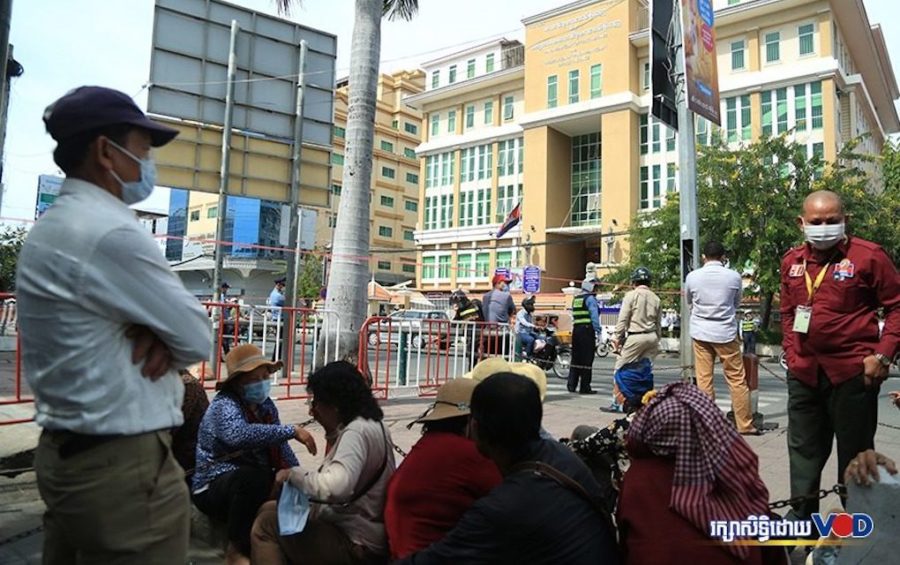Representatives of the U.S., E.U., U.K. and Australia this week raised concerns over the Phnom Penh Municipal Court sentencing nine CNRP opposition leaders to 20 to 25 years in prison for a planned “attack” on the state.
The banned political party’s co-founder Sam Rainsy, vice presidents Mu Sochua and Eng Chhai Eang, and former lawmakers Tioulong Saumura, Nut Romduol, Ho Vann, Ou Chanrith, Long Ry and Men Sothavarin were all found guilty on Monday in a session neither defense lawyers nor trial monitors attended due to Covid-19 closures.
During their trial, the court cited speeches about raising money to support defecting soldiers as evidence that the leaders, who are all living abroad, were planning a coup d’etat around Rainsy’s attempted return to the country in November 2019.
The CNRP was formerly the country’s main opposition party, making significant gains in elections in 2013 and 2017, before being dissolved by court order in November 2017.
Other related trials against CNRP officials and supporters, involving more than 150 defendants, are ongoing.
“Troubled by sentences today targeting political opposition leaders,” U.S. Ambassador Patrick Murphy said on Twitter on Monday, “particularly given a lack of due process. We urge authorities to reopen political space and allow all voices to be heard and to participate.”
“We are concerned by the verdicts and lengthy sentences of opposition members held in absentia,” the U.K. Embassy said, also on Twitter on Tuesday. “We urge authorities to respect the rule of law and ensure fundamental freedoms are respected.”
Australian Ambassador Pablo Kang tweeted on Tuesday that he was “concerned” about the mass trials and urged the government to rebuild relations with opposition members during a meeting with Defense Minister Tea Banh.
The E.U., meanwhile, issued a statement, also on Tuesday, saying the case appeared to violate due process rights.
“The verdict was pronounced after swift trials conducted in absentia. The accused were not allowed to return to the country to defend their cases in court, in what appears to be a violation of due process rights, firmly established by international human rights law,” it said.
“The European Union reiterates its call on the Cambodian authorities to initiate a process of national reconciliation through genuine and inclusive dialogue.”
The E.U. last year partially suspended preferential trade benefits with Cambodia over “serious and systematic” human rights abuses, including the dissolution of the political opposition and banning of 118 of its senior officials from politics for five years.
The U.S. has repeatedly considered similar action against Cambodia, while Sweden began phasing out direct funding to Cambodia last June, citing restrictions on democratic space.
Am Sam Ath, monitoring manager at human rights group Licadho, cautioned that Cambodia could face further sanctions in light of the reaction from the international community.
“We’ve seen a number of officials put on a blacklist to be sanctioned,” Sam Ath said in reference to U.S. actions under the Global Magnitsky Act. “It is an international mechanism to promote reform, and improve democracy and the respect for human rights.”
Social observer Seng Sary, however, said judging from the recent past, it was unlikely the ruling party would listen.
“So far, the government seems to be ignoring the statements and appeals, including the economic pressure put on the government,” he said.
Government spokesperson Phay Siphan dismissed the foreign criticism, calling the convicted opposition leaders instigators of unrest in the country.
“Cambodia does not allow rebels or coup d’etat plotters to make Cambodia as chaotic as it used to be. Cambodia must take responsibility,” he said.
Justice Ministry spokesperson Chin Malin also rejected the foreign concerns. Prosecuting a coup attempt as an attack was appropriate, and the courts must not be pressured in their work, he said.
“To me, the criticism from the European Union and some foreigners is unfair to Cambodia,” Malin said. “There are double standards, because their statements are not based on the legal aspects that are in force in Cambodia, but protect the perpetrators.”
A statement from Cambodia’s ambassador to the U.N., An Sokkhoeurn, on Tuesday also disputed claims that Cambodia’s political space was restricted, saying 14 former opposition politicians had their political rights reinstated.
“The purported mass trial is linked to the ‘9th November 2019 plot’, equivalent to a coup, yet timely thwarted,” the statement adds. “It is not a human right narrative, but law enforcement in favor of national security.”












